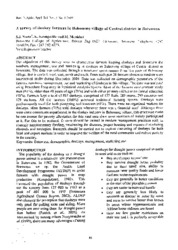A survey of donkey farmers in Bobonong village of Central district in Botswana

View/
Date
2008Author
Nsoso, Shalaulani James
Keongadile, K.
Monkhei, Milly
Metadata
Show full item recordAbstract
The objectives of this survey were to characterise farmers keeping donkeys and document the numbers, management, use and marketing of donkeys in Bobonong village of Central district in Botswana. The data was collected through a structured questionnaire from five parts of Bobonong village, that is central, west, cast, north and south. From each part 20 farmers chosen al random were interviewed orally during December 2004. Data was collected on demographic parameters of the farmers, numbers, management, use and marketing of donkeys in this village. The data was analyzed using Procedure Frequency in Statistical Analysis System. Most of the farmers were predominantly men (61%), older than 40 years of age (79%) and with either primary (45%) or no formal education (40%). Farmers kept a total of <887 donkeys, comprised of 177 foals, 288 mares. 293 castrates and129 stallions. All the farmers (100%) practised traditional farming system. Donkeys were predominantly used for both ploughing and transport (81%). There were no organized markets for donkeys. Most farmers (71%) sold donkeys whenever there was a financial need. Although there were some constraints experienced in the donkey industry in Bobonong village, this enterprise could be one avenue for poverty alleviation for this rural area since most members of society participated in it. For this to be realised, farmers should be trained in modem management practices such as strategic supplementary feeding, vaccinating for diseases, proper housing and organised marketing channels and strategies. Research should be carried out to explore marketing of donkeys for both local and export markets in order to improve the welfare of the rural community and reduce poverty in the country.
